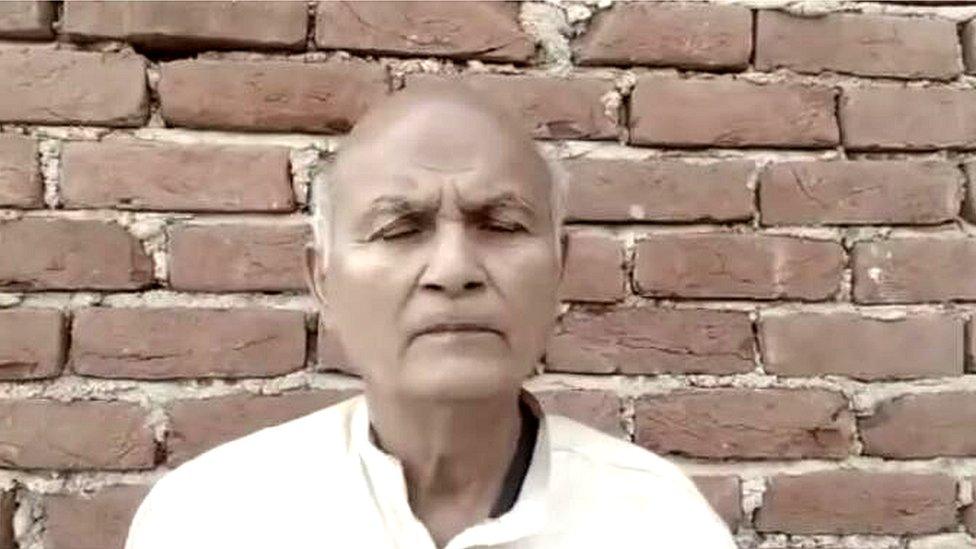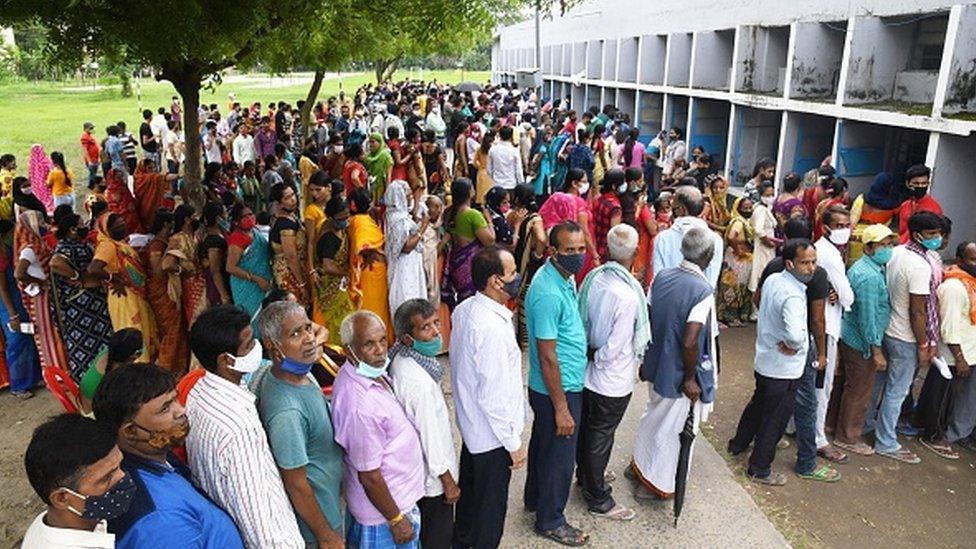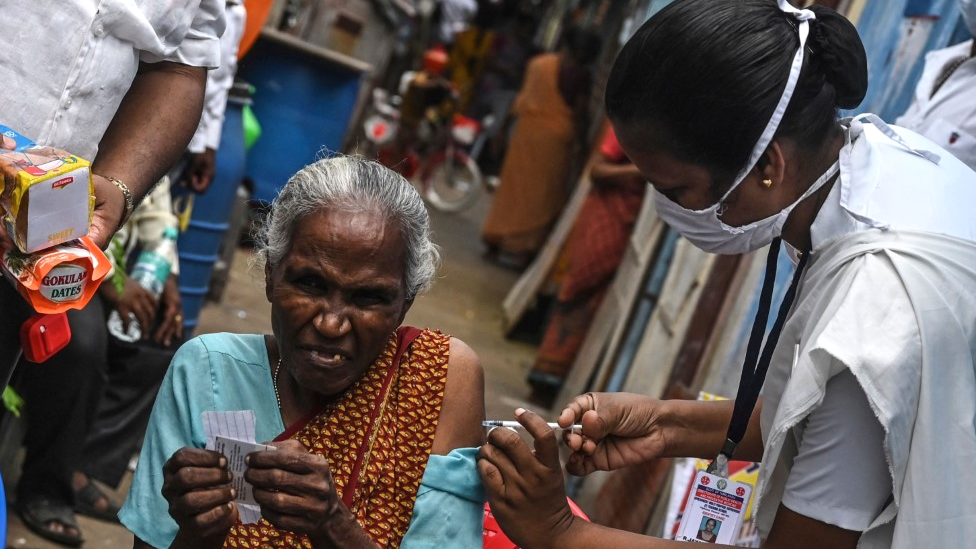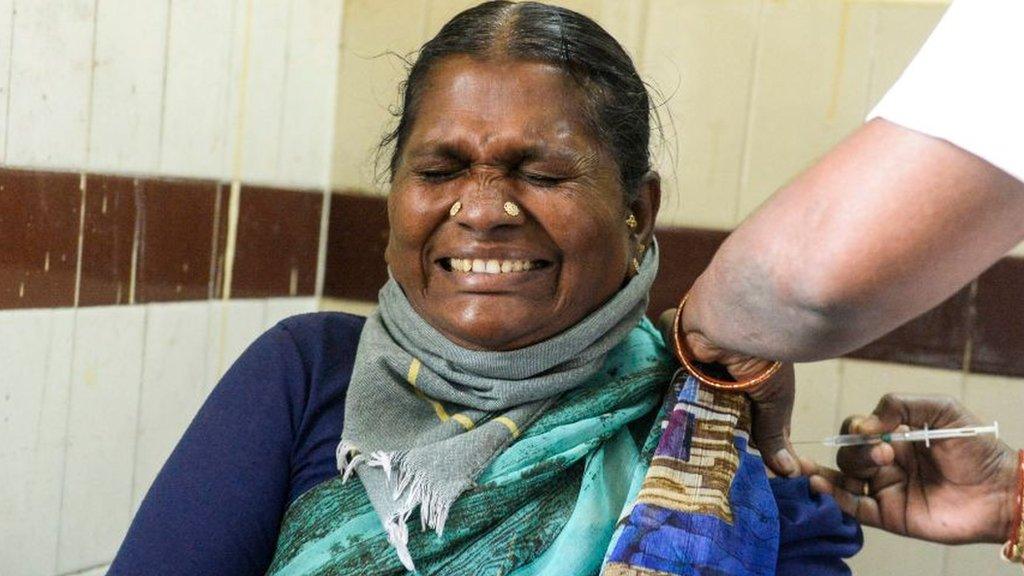Covid-19: Indian man has taken at least eight Covid jabs
- Published

Brahmdeo Mandal, 65, has claimed that he received 11 doses of the vaccine
A man in India got jabbed with a Covid-19 vaccine at least eight times last year, a health official said.
Brahmdeo Mandal, 65, has claimed that he received 11 doses of the vaccine in Bihar state.
The retired postman said the jabs had helped him to get rid of aches and pains and "stay healthy". He claimed he had not suffered any adverse effects.
Mr Mondal was finally stopped from taking what he claimed was his 12th jab at a camp last week.
A probe is underway to find out how Mr Mandal, who lives with his family in Madhepura district, managed to get multiple jabs.
"We have already found evidence that he took eight jabs from four places," Amarendra Pratap Shahi, civil surgeon of Madhepura, told the BBC.
Since vaccination began on 16 January last year, India has been mainly administering two locally-manufactured vaccines, Covishield and Covaxin. The two-dose vaccines have a gap from 12-16 weeks and four to six weeks after the first dose respectively.
Vaccination is voluntary, and more than 90,000 centres, mostly state-run, are offering jabs across the country.
These include vaccination camps offering walk-in jabs without prior online registration. The beneficiary needs to furnish identity proof - a biometric card, voter ID or driving licence, among 10 documents - to register.
The data gathered from the sites is uploaded to India's vaccine portal, CoWin.

Some 36% of the adult population in Bihar is fully vaccinated
Early investigations had found that Mr Mandal had managed to take "two jabs in a half hour gap" on the same day and each of these jabs "were registered on the portal".
"We are flummoxed how this could happen. There seems to be a portal failure happening. We are also trying to find out whether there was any negligence by people manning the vaccination centres," Mr Shahi said.
Public health expert Chandrakant Lahariya told the BBC that the "only way" this can happen is if the vaccination data from the sites is uploaded on the portal after a long lag.
"But I still wonder it was not detected after so many jabs over so long a time."
Mr Mandal, who kept detailed handwritten notes of the dates, timings and camps, claims he received 11 doses between February and December last year.
He told the BBC that he travelled to vaccination camps across Madhepura and even to at least two neighbouring districts - one more than 100km (62 miles) away - to get the jabs. He used different identity cards to register at these sites.
Mr Mandal said he had been a "practising quack" in his village before taking up a postman's job and "knew a thing about diseases".
"After taking the jabs my body aches and pain disappeared. I used to have knee pain and walked with a stick. Now I don't. I feel fine."
Fever, headache, fatigue and pain - mostly mild to moderate - are the most commonly reported side effects after getting a Covid-19 vaccine. Severe allergic reactions are rarer.
"You will usually get these reactions after the first and the second dose. Multiple doses of these vaccines should be fairly harmless, as antibodies have already been formed and the vaccines are made up of harmless components," Dr Lahariya said.
Some 65% of India's adult population is fully vaccinated and around 91% have got at least one dose.
The numbers in Bihar are lower: 36% of the adult population is fully vaccinated and 49% have received at least one dose.

The jungle-trekking Covid vaccinators helping to protect remote Indian villages.
Related topics
- Published31 December 2021

- Published18 July 2022
